Corporate Social Responsibility and CEO Pay
VerifiedAdded on 2020/05/11
|17
|4189
|113
AI Summary
This assignment delves into the complex relationship between corporate social responsibility (CSR) and executive compensation. It requires a critical analysis of relevant academic research papers, examining the arguments presented regarding the influence of CSR on CEO pay. Students are expected to synthesize findings from these papers, providing a comprehensive overview of the current understanding of this topic and its implications for businesses and society.
Contribute Materials
Your contribution can guide someone’s learning journey. Share your
documents today.

Accounting 1
Accounting
Accounting
Secure Best Marks with AI Grader
Need help grading? Try our AI Grader for instant feedback on your assignments.
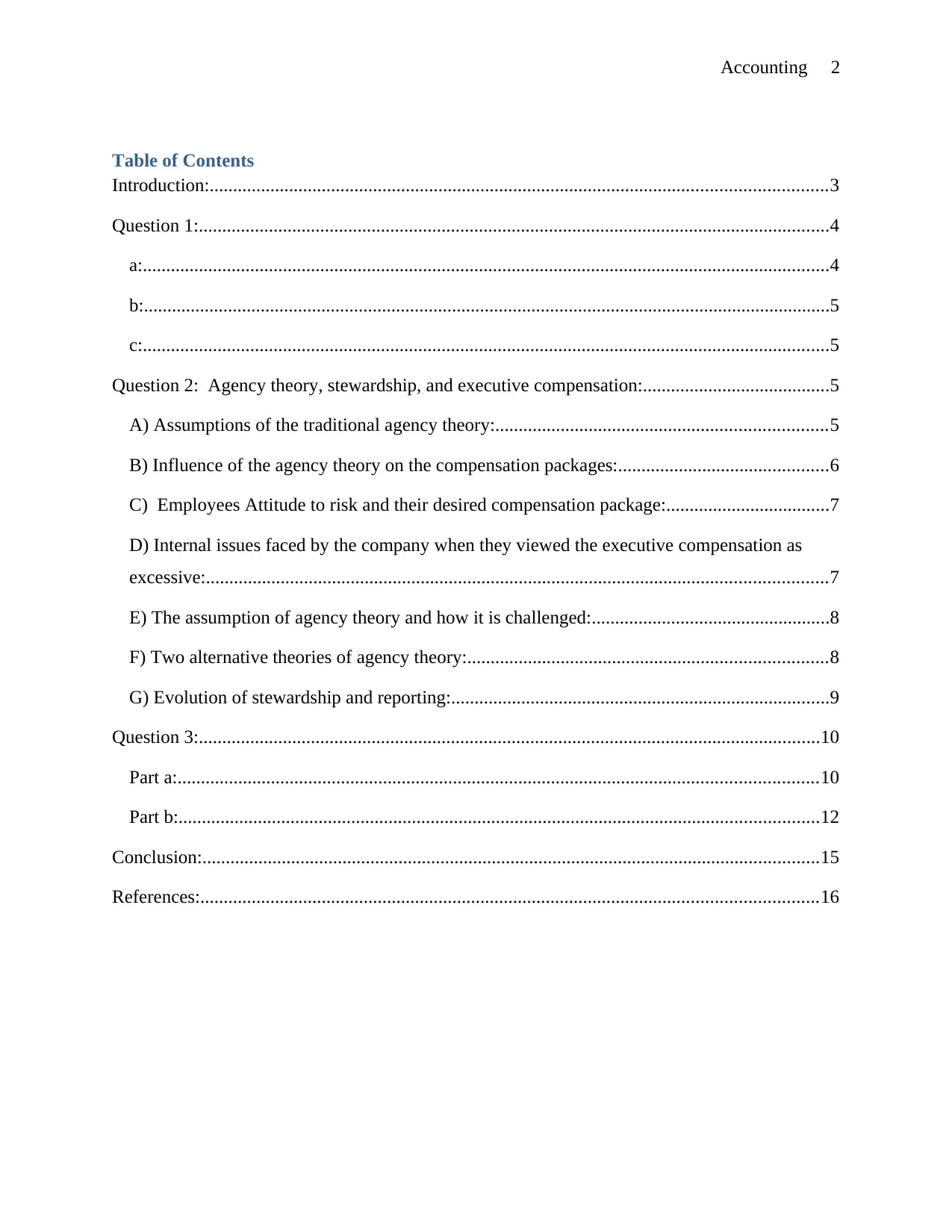
Accounting 2
Table of Contents
Introduction:....................................................................................................................................3
Question 1:.......................................................................................................................................4
a:...................................................................................................................................................4
b:...................................................................................................................................................5
c:...................................................................................................................................................5
Question 2: Agency theory, stewardship, and executive compensation:........................................5
A) Assumptions of the traditional agency theory:.......................................................................5
B) Influence of the agency theory on the compensation packages:.............................................6
C) Employees Attitude to risk and their desired compensation package:...................................7
D) Internal issues faced by the company when they viewed the executive compensation as
excessive:.....................................................................................................................................7
E) The assumption of agency theory and how it is challenged:...................................................8
F) Two alternative theories of agency theory:.............................................................................8
G) Evolution of stewardship and reporting:.................................................................................9
Question 3:.....................................................................................................................................10
Part a:.........................................................................................................................................10
Part b:.........................................................................................................................................12
Conclusion:....................................................................................................................................15
References:....................................................................................................................................16
Table of Contents
Introduction:....................................................................................................................................3
Question 1:.......................................................................................................................................4
a:...................................................................................................................................................4
b:...................................................................................................................................................5
c:...................................................................................................................................................5
Question 2: Agency theory, stewardship, and executive compensation:........................................5
A) Assumptions of the traditional agency theory:.......................................................................5
B) Influence of the agency theory on the compensation packages:.............................................6
C) Employees Attitude to risk and their desired compensation package:...................................7
D) Internal issues faced by the company when they viewed the executive compensation as
excessive:.....................................................................................................................................7
E) The assumption of agency theory and how it is challenged:...................................................8
F) Two alternative theories of agency theory:.............................................................................8
G) Evolution of stewardship and reporting:.................................................................................9
Question 3:.....................................................................................................................................10
Part a:.........................................................................................................................................10
Part b:.........................................................................................................................................12
Conclusion:....................................................................................................................................15
References:....................................................................................................................................16
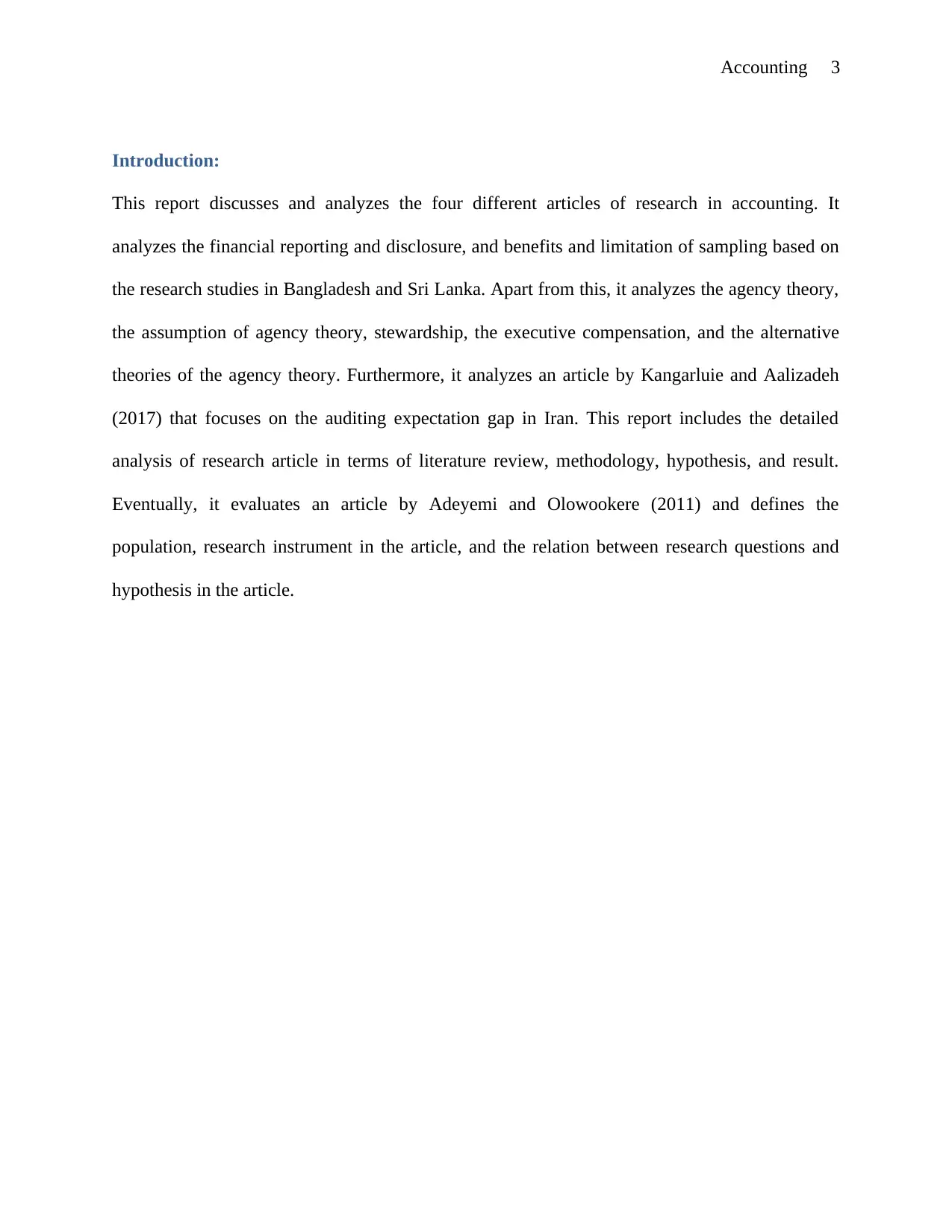
Accounting 3
Introduction:
This report discusses and analyzes the four different articles of research in accounting. It
analyzes the financial reporting and disclosure, and benefits and limitation of sampling based on
the research studies in Bangladesh and Sri Lanka. Apart from this, it analyzes the agency theory,
the assumption of agency theory, stewardship, the executive compensation, and the alternative
theories of the agency theory. Furthermore, it analyzes an article by Kangarluie and Aalizadeh
(2017) that focuses on the auditing expectation gap in Iran. This report includes the detailed
analysis of research article in terms of literature review, methodology, hypothesis, and result.
Eventually, it evaluates an article by Adeyemi and Olowookere (2011) and defines the
population, research instrument in the article, and the relation between research questions and
hypothesis in the article.
Introduction:
This report discusses and analyzes the four different articles of research in accounting. It
analyzes the financial reporting and disclosure, and benefits and limitation of sampling based on
the research studies in Bangladesh and Sri Lanka. Apart from this, it analyzes the agency theory,
the assumption of agency theory, stewardship, the executive compensation, and the alternative
theories of the agency theory. Furthermore, it analyzes an article by Kangarluie and Aalizadeh
(2017) that focuses on the auditing expectation gap in Iran. This report includes the detailed
analysis of research article in terms of literature review, methodology, hypothesis, and result.
Eventually, it evaluates an article by Adeyemi and Olowookere (2011) and defines the
population, research instrument in the article, and the relation between research questions and
hypothesis in the article.
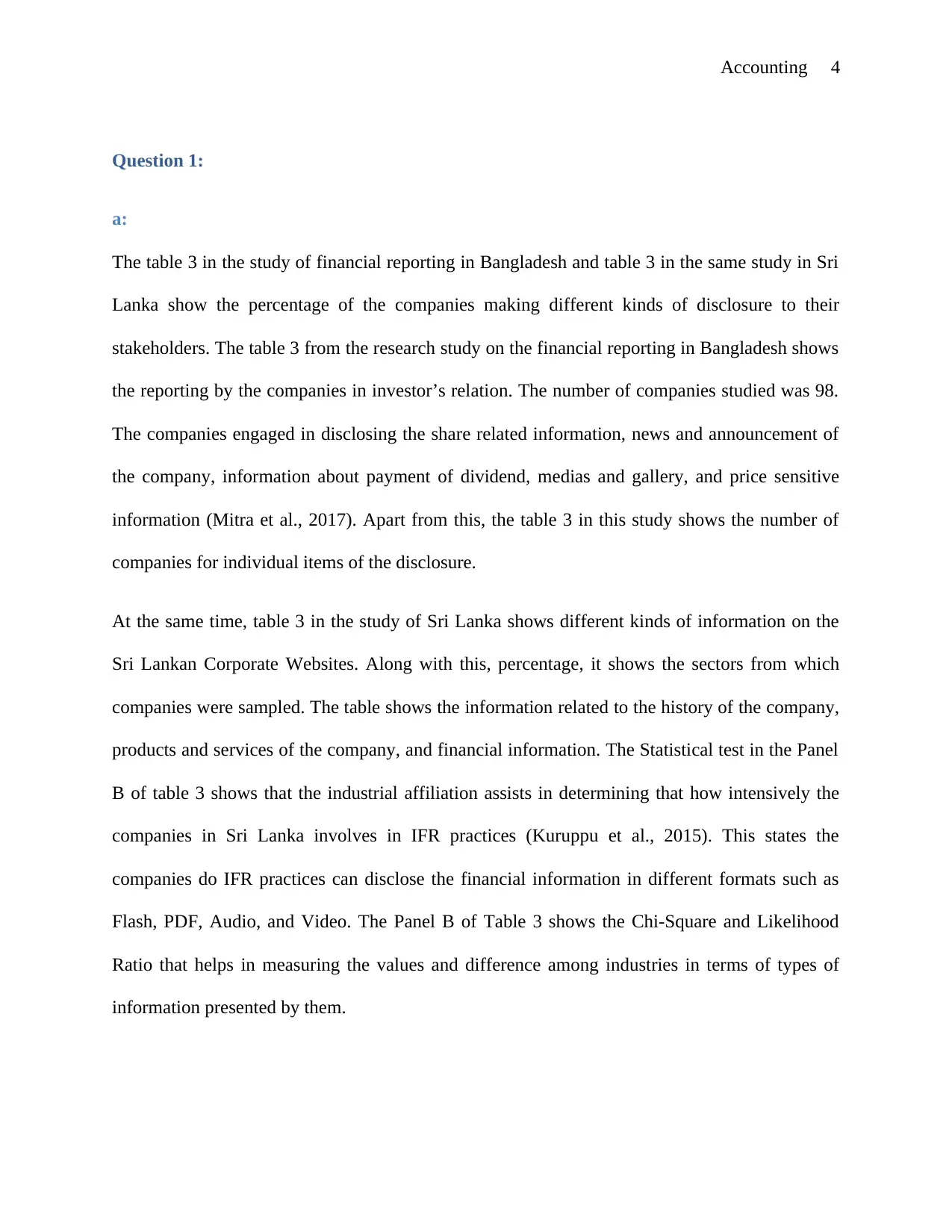
Accounting 4
Question 1:
a:
The table 3 in the study of financial reporting in Bangladesh and table 3 in the same study in Sri
Lanka show the percentage of the companies making different kinds of disclosure to their
stakeholders. The table 3 from the research study on the financial reporting in Bangladesh shows
the reporting by the companies in investor’s relation. The number of companies studied was 98.
The companies engaged in disclosing the share related information, news and announcement of
the company, information about payment of dividend, medias and gallery, and price sensitive
information (Mitra et al., 2017). Apart from this, the table 3 in this study shows the number of
companies for individual items of the disclosure.
At the same time, table 3 in the study of Sri Lanka shows different kinds of information on the
Sri Lankan Corporate Websites. Along with this, percentage, it shows the sectors from which
companies were sampled. The table shows the information related to the history of the company,
products and services of the company, and financial information. The Statistical test in the Panel
B of table 3 shows that the industrial affiliation assists in determining that how intensively the
companies in Sri Lanka involves in IFR practices (Kuruppu et al., 2015). This states the
companies do IFR practices can disclose the financial information in different formats such as
Flash, PDF, Audio, and Video. The Panel B of Table 3 shows the Chi-Square and Likelihood
Ratio that helps in measuring the values and difference among industries in terms of types of
information presented by them.
Question 1:
a:
The table 3 in the study of financial reporting in Bangladesh and table 3 in the same study in Sri
Lanka show the percentage of the companies making different kinds of disclosure to their
stakeholders. The table 3 from the research study on the financial reporting in Bangladesh shows
the reporting by the companies in investor’s relation. The number of companies studied was 98.
The companies engaged in disclosing the share related information, news and announcement of
the company, information about payment of dividend, medias and gallery, and price sensitive
information (Mitra et al., 2017). Apart from this, the table 3 in this study shows the number of
companies for individual items of the disclosure.
At the same time, table 3 in the study of Sri Lanka shows different kinds of information on the
Sri Lankan Corporate Websites. Along with this, percentage, it shows the sectors from which
companies were sampled. The table shows the information related to the history of the company,
products and services of the company, and financial information. The Statistical test in the Panel
B of table 3 shows that the industrial affiliation assists in determining that how intensively the
companies in Sri Lanka involves in IFR practices (Kuruppu et al., 2015). This states the
companies do IFR practices can disclose the financial information in different formats such as
Flash, PDF, Audio, and Video. The Panel B of Table 3 shows the Chi-Square and Likelihood
Ratio that helps in measuring the values and difference among industries in terms of types of
information presented by them.
Secure Best Marks with AI Grader
Need help grading? Try our AI Grader for instant feedback on your assignments.
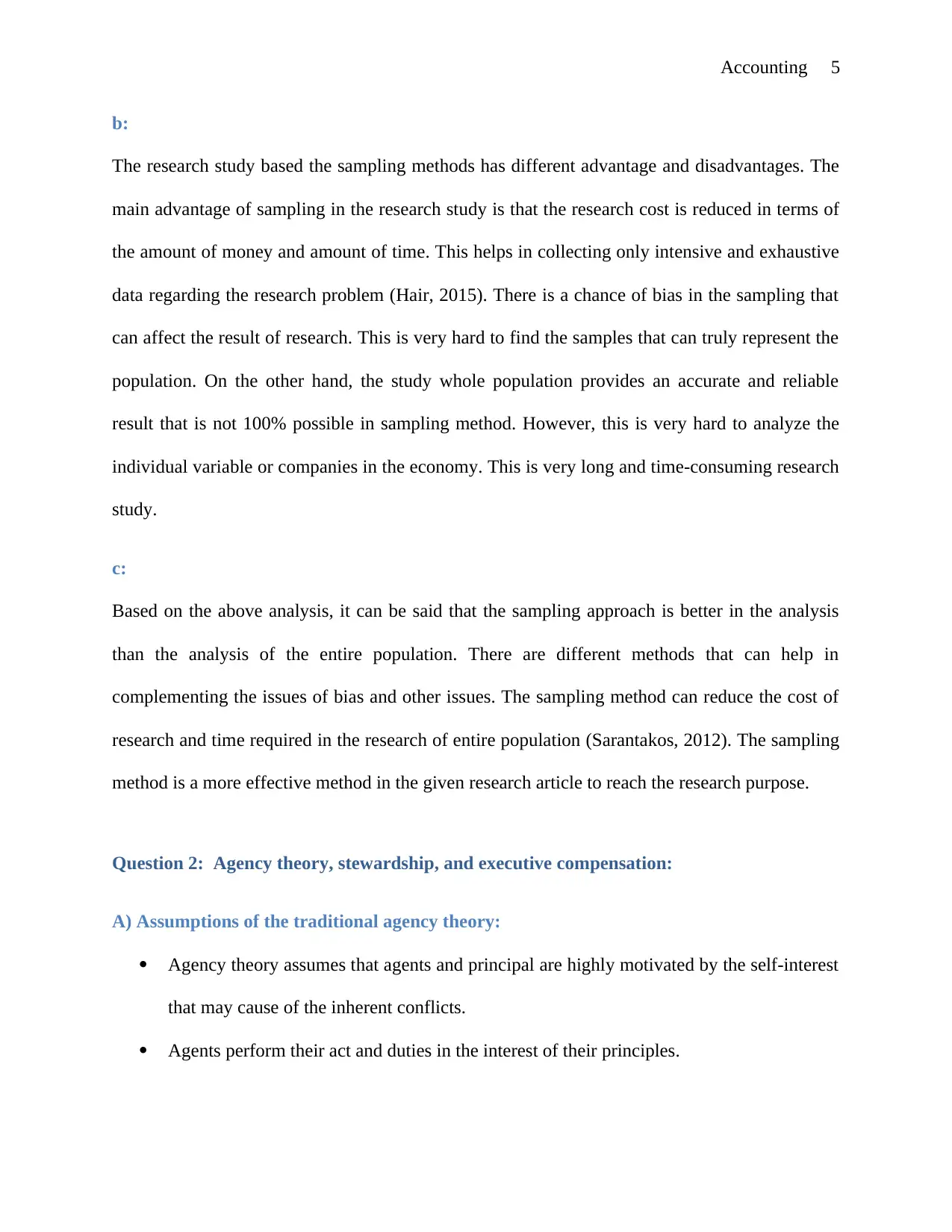
Accounting 5
b:
The research study based the sampling methods has different advantage and disadvantages. The
main advantage of sampling in the research study is that the research cost is reduced in terms of
the amount of money and amount of time. This helps in collecting only intensive and exhaustive
data regarding the research problem (Hair, 2015). There is a chance of bias in the sampling that
can affect the result of research. This is very hard to find the samples that can truly represent the
population. On the other hand, the study whole population provides an accurate and reliable
result that is not 100% possible in sampling method. However, this is very hard to analyze the
individual variable or companies in the economy. This is very long and time-consuming research
study.
c:
Based on the above analysis, it can be said that the sampling approach is better in the analysis
than the analysis of the entire population. There are different methods that can help in
complementing the issues of bias and other issues. The sampling method can reduce the cost of
research and time required in the research of entire population (Sarantakos, 2012). The sampling
method is a more effective method in the given research article to reach the research purpose.
Question 2: Agency theory, stewardship, and executive compensation:
A) Assumptions of the traditional agency theory:
Agency theory assumes that agents and principal are highly motivated by the self-interest
that may cause of the inherent conflicts.
Agents perform their act and duties in the interest of their principles.
b:
The research study based the sampling methods has different advantage and disadvantages. The
main advantage of sampling in the research study is that the research cost is reduced in terms of
the amount of money and amount of time. This helps in collecting only intensive and exhaustive
data regarding the research problem (Hair, 2015). There is a chance of bias in the sampling that
can affect the result of research. This is very hard to find the samples that can truly represent the
population. On the other hand, the study whole population provides an accurate and reliable
result that is not 100% possible in sampling method. However, this is very hard to analyze the
individual variable or companies in the economy. This is very long and time-consuming research
study.
c:
Based on the above analysis, it can be said that the sampling approach is better in the analysis
than the analysis of the entire population. There are different methods that can help in
complementing the issues of bias and other issues. The sampling method can reduce the cost of
research and time required in the research of entire population (Sarantakos, 2012). The sampling
method is a more effective method in the given research article to reach the research purpose.
Question 2: Agency theory, stewardship, and executive compensation:
A) Assumptions of the traditional agency theory:
Agency theory assumes that agents and principal are highly motivated by the self-interest
that may cause of the inherent conflicts.
Agents perform their act and duties in the interest of their principles.
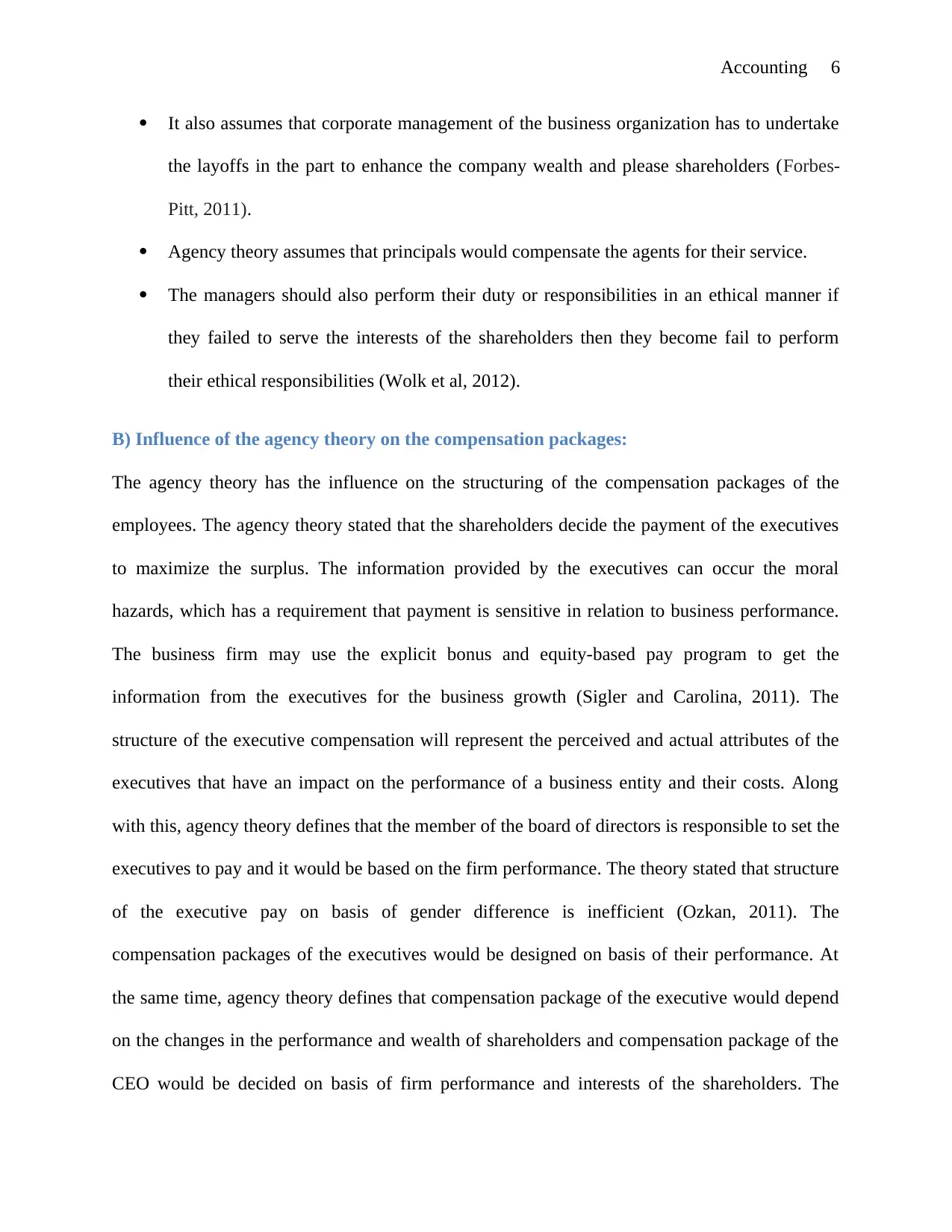
Accounting 6
It also assumes that corporate management of the business organization has to undertake
the layoffs in the part to enhance the company wealth and please shareholders (Forbes-
Pitt, 2011).
Agency theory assumes that principals would compensate the agents for their service.
The managers should also perform their duty or responsibilities in an ethical manner if
they failed to serve the interests of the shareholders then they become fail to perform
their ethical responsibilities (Wolk et al, 2012).
B) Influence of the agency theory on the compensation packages:
The agency theory has the influence on the structuring of the compensation packages of the
employees. The agency theory stated that the shareholders decide the payment of the executives
to maximize the surplus. The information provided by the executives can occur the moral
hazards, which has a requirement that payment is sensitive in relation to business performance.
The business firm may use the explicit bonus and equity-based pay program to get the
information from the executives for the business growth (Sigler and Carolina, 2011). The
structure of the executive compensation will represent the perceived and actual attributes of the
executives that have an impact on the performance of a business entity and their costs. Along
with this, agency theory defines that the member of the board of directors is responsible to set the
executives to pay and it would be based on the firm performance. The theory stated that structure
of the executive pay on basis of gender difference is inefficient (Ozkan, 2011). The
compensation packages of the executives would be designed on basis of their performance. At
the same time, agency theory defines that compensation package of the executive would depend
on the changes in the performance and wealth of shareholders and compensation package of the
CEO would be decided on basis of firm performance and interests of the shareholders. The
It also assumes that corporate management of the business organization has to undertake
the layoffs in the part to enhance the company wealth and please shareholders (Forbes-
Pitt, 2011).
Agency theory assumes that principals would compensate the agents for their service.
The managers should also perform their duty or responsibilities in an ethical manner if
they failed to serve the interests of the shareholders then they become fail to perform
their ethical responsibilities (Wolk et al, 2012).
B) Influence of the agency theory on the compensation packages:
The agency theory has the influence on the structuring of the compensation packages of the
employees. The agency theory stated that the shareholders decide the payment of the executives
to maximize the surplus. The information provided by the executives can occur the moral
hazards, which has a requirement that payment is sensitive in relation to business performance.
The business firm may use the explicit bonus and equity-based pay program to get the
information from the executives for the business growth (Sigler and Carolina, 2011). The
structure of the executive compensation will represent the perceived and actual attributes of the
executives that have an impact on the performance of a business entity and their costs. Along
with this, agency theory defines that the member of the board of directors is responsible to set the
executives to pay and it would be based on the firm performance. The theory stated that structure
of the executive pay on basis of gender difference is inefficient (Ozkan, 2011). The
compensation packages of the executives would be designed on basis of their performance. At
the same time, agency theory defines that compensation package of the executive would depend
on the changes in the performance and wealth of shareholders and compensation package of the
CEO would be decided on basis of firm performance and interests of the shareholders. The
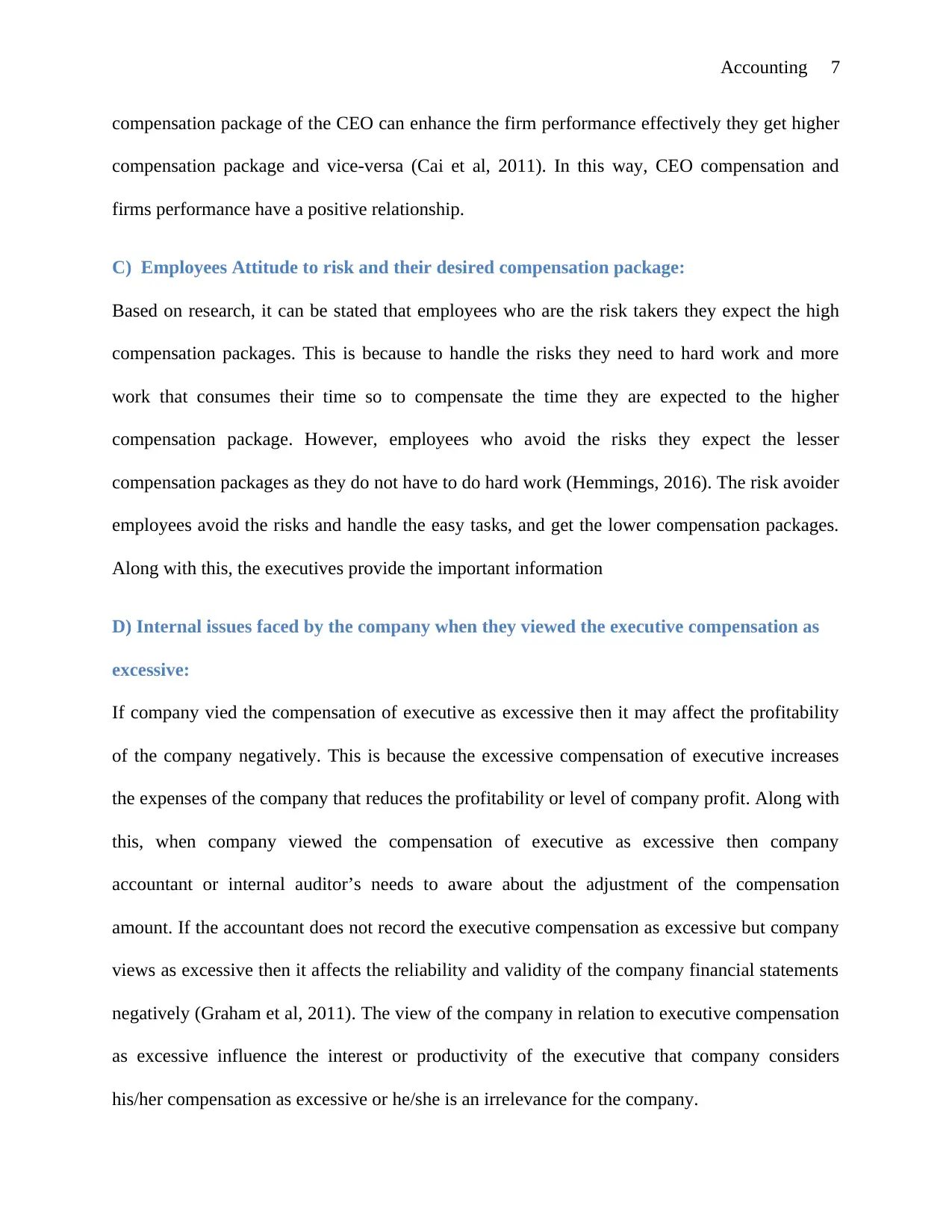
Accounting 7
compensation package of the CEO can enhance the firm performance effectively they get higher
compensation package and vice-versa (Cai et al, 2011). In this way, CEO compensation and
firms performance have a positive relationship.
C) Employees Attitude to risk and their desired compensation package:
Based on research, it can be stated that employees who are the risk takers they expect the high
compensation packages. This is because to handle the risks they need to hard work and more
work that consumes their time so to compensate the time they are expected to the higher
compensation package. However, employees who avoid the risks they expect the lesser
compensation packages as they do not have to do hard work (Hemmings, 2016). The risk avoider
employees avoid the risks and handle the easy tasks, and get the lower compensation packages.
Along with this, the executives provide the important information
D) Internal issues faced by the company when they viewed the executive compensation as
excessive:
If company vied the compensation of executive as excessive then it may affect the profitability
of the company negatively. This is because the excessive compensation of executive increases
the expenses of the company that reduces the profitability or level of company profit. Along with
this, when company viewed the compensation of executive as excessive then company
accountant or internal auditor’s needs to aware about the adjustment of the compensation
amount. If the accountant does not record the executive compensation as excessive but company
views as excessive then it affects the reliability and validity of the company financial statements
negatively (Graham et al, 2011). The view of the company in relation to executive compensation
as excessive influence the interest or productivity of the executive that company considers
his/her compensation as excessive or he/she is an irrelevance for the company.
compensation package of the CEO can enhance the firm performance effectively they get higher
compensation package and vice-versa (Cai et al, 2011). In this way, CEO compensation and
firms performance have a positive relationship.
C) Employees Attitude to risk and their desired compensation package:
Based on research, it can be stated that employees who are the risk takers they expect the high
compensation packages. This is because to handle the risks they need to hard work and more
work that consumes their time so to compensate the time they are expected to the higher
compensation package. However, employees who avoid the risks they expect the lesser
compensation packages as they do not have to do hard work (Hemmings, 2016). The risk avoider
employees avoid the risks and handle the easy tasks, and get the lower compensation packages.
Along with this, the executives provide the important information
D) Internal issues faced by the company when they viewed the executive compensation as
excessive:
If company vied the compensation of executive as excessive then it may affect the profitability
of the company negatively. This is because the excessive compensation of executive increases
the expenses of the company that reduces the profitability or level of company profit. Along with
this, when company viewed the compensation of executive as excessive then company
accountant or internal auditor’s needs to aware about the adjustment of the compensation
amount. If the accountant does not record the executive compensation as excessive but company
views as excessive then it affects the reliability and validity of the company financial statements
negatively (Graham et al, 2011). The view of the company in relation to executive compensation
as excessive influence the interest or productivity of the executive that company considers
his/her compensation as excessive or he/she is an irrelevance for the company.
Paraphrase This Document
Need a fresh take? Get an instant paraphrase of this document with our AI Paraphraser
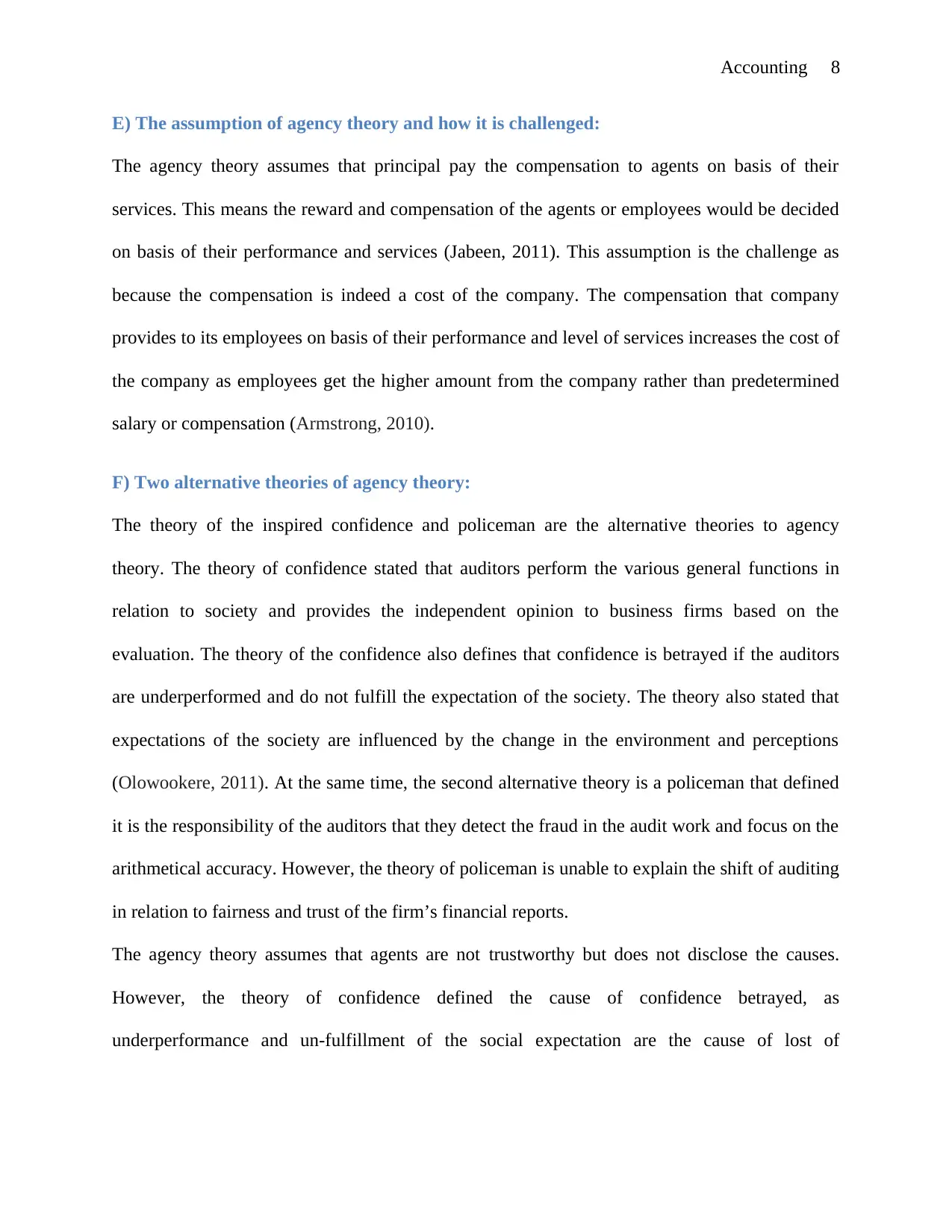
Accounting 8
E) The assumption of agency theory and how it is challenged:
The agency theory assumes that principal pay the compensation to agents on basis of their
services. This means the reward and compensation of the agents or employees would be decided
on basis of their performance and services (Jabeen, 2011). This assumption is the challenge as
because the compensation is indeed a cost of the company. The compensation that company
provides to its employees on basis of their performance and level of services increases the cost of
the company as employees get the higher amount from the company rather than predetermined
salary or compensation (Armstrong, 2010).
F) Two alternative theories of agency theory:
The theory of the inspired confidence and policeman are the alternative theories to agency
theory. The theory of confidence stated that auditors perform the various general functions in
relation to society and provides the independent opinion to business firms based on the
evaluation. The theory of the confidence also defines that confidence is betrayed if the auditors
are underperformed and do not fulfill the expectation of the society. The theory also stated that
expectations of the society are influenced by the change in the environment and perceptions
(Olowookere, 2011). At the same time, the second alternative theory is a policeman that defined
it is the responsibility of the auditors that they detect the fraud in the audit work and focus on the
arithmetical accuracy. However, the theory of policeman is unable to explain the shift of auditing
in relation to fairness and trust of the firm’s financial reports.
The agency theory assumes that agents are not trustworthy but does not disclose the causes.
However, the theory of confidence defined the cause of confidence betrayed, as
underperformance and un-fulfillment of the social expectation are the cause of lost of
E) The assumption of agency theory and how it is challenged:
The agency theory assumes that principal pay the compensation to agents on basis of their
services. This means the reward and compensation of the agents or employees would be decided
on basis of their performance and services (Jabeen, 2011). This assumption is the challenge as
because the compensation is indeed a cost of the company. The compensation that company
provides to its employees on basis of their performance and level of services increases the cost of
the company as employees get the higher amount from the company rather than predetermined
salary or compensation (Armstrong, 2010).
F) Two alternative theories of agency theory:
The theory of the inspired confidence and policeman are the alternative theories to agency
theory. The theory of confidence stated that auditors perform the various general functions in
relation to society and provides the independent opinion to business firms based on the
evaluation. The theory of the confidence also defines that confidence is betrayed if the auditors
are underperformed and do not fulfill the expectation of the society. The theory also stated that
expectations of the society are influenced by the change in the environment and perceptions
(Olowookere, 2011). At the same time, the second alternative theory is a policeman that defined
it is the responsibility of the auditors that they detect the fraud in the audit work and focus on the
arithmetical accuracy. However, the theory of policeman is unable to explain the shift of auditing
in relation to fairness and trust of the firm’s financial reports.
The agency theory assumes that agents are not trustworthy but does not disclose the causes.
However, the theory of confidence defined the cause of confidence betrayed, as
underperformance and un-fulfillment of the social expectation are the cause of lost of
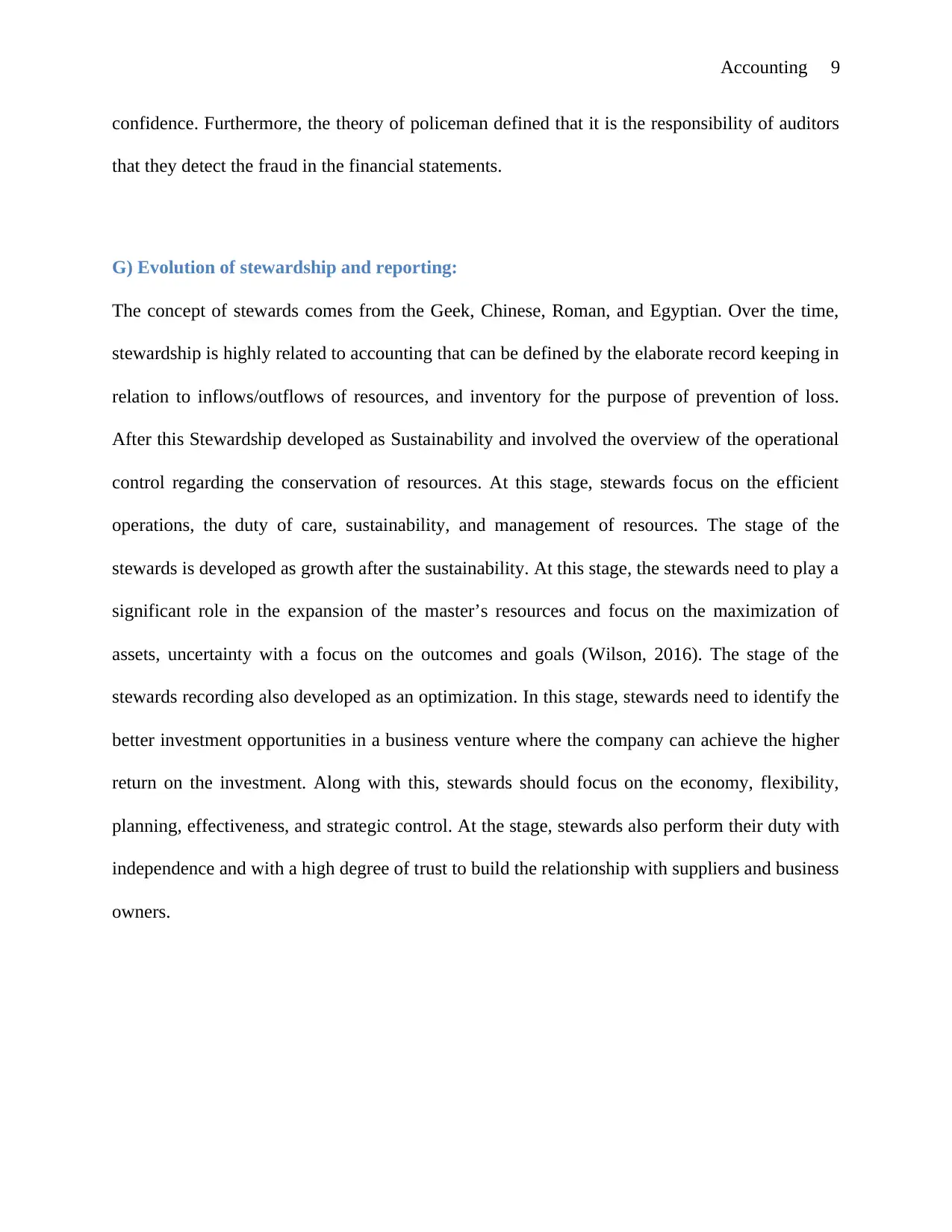
Accounting 9
confidence. Furthermore, the theory of policeman defined that it is the responsibility of auditors
that they detect the fraud in the financial statements.
G) Evolution of stewardship and reporting:
The concept of stewards comes from the Geek, Chinese, Roman, and Egyptian. Over the time,
stewardship is highly related to accounting that can be defined by the elaborate record keeping in
relation to inflows/outflows of resources, and inventory for the purpose of prevention of loss.
After this Stewardship developed as Sustainability and involved the overview of the operational
control regarding the conservation of resources. At this stage, stewards focus on the efficient
operations, the duty of care, sustainability, and management of resources. The stage of the
stewards is developed as growth after the sustainability. At this stage, the stewards need to play a
significant role in the expansion of the master’s resources and focus on the maximization of
assets, uncertainty with a focus on the outcomes and goals (Wilson, 2016). The stage of the
stewards recording also developed as an optimization. In this stage, stewards need to identify the
better investment opportunities in a business venture where the company can achieve the higher
return on the investment. Along with this, stewards should focus on the economy, flexibility,
planning, effectiveness, and strategic control. At the stage, stewards also perform their duty with
independence and with a high degree of trust to build the relationship with suppliers and business
owners.
confidence. Furthermore, the theory of policeman defined that it is the responsibility of auditors
that they detect the fraud in the financial statements.
G) Evolution of stewardship and reporting:
The concept of stewards comes from the Geek, Chinese, Roman, and Egyptian. Over the time,
stewardship is highly related to accounting that can be defined by the elaborate record keeping in
relation to inflows/outflows of resources, and inventory for the purpose of prevention of loss.
After this Stewardship developed as Sustainability and involved the overview of the operational
control regarding the conservation of resources. At this stage, stewards focus on the efficient
operations, the duty of care, sustainability, and management of resources. The stage of the
stewards is developed as growth after the sustainability. At this stage, the stewards need to play a
significant role in the expansion of the master’s resources and focus on the maximization of
assets, uncertainty with a focus on the outcomes and goals (Wilson, 2016). The stage of the
stewards recording also developed as an optimization. In this stage, stewards need to identify the
better investment opportunities in a business venture where the company can achieve the higher
return on the investment. Along with this, stewards should focus on the economy, flexibility,
planning, effectiveness, and strategic control. At the stage, stewards also perform their duty with
independence and with a high degree of trust to build the relationship with suppliers and business
owners.
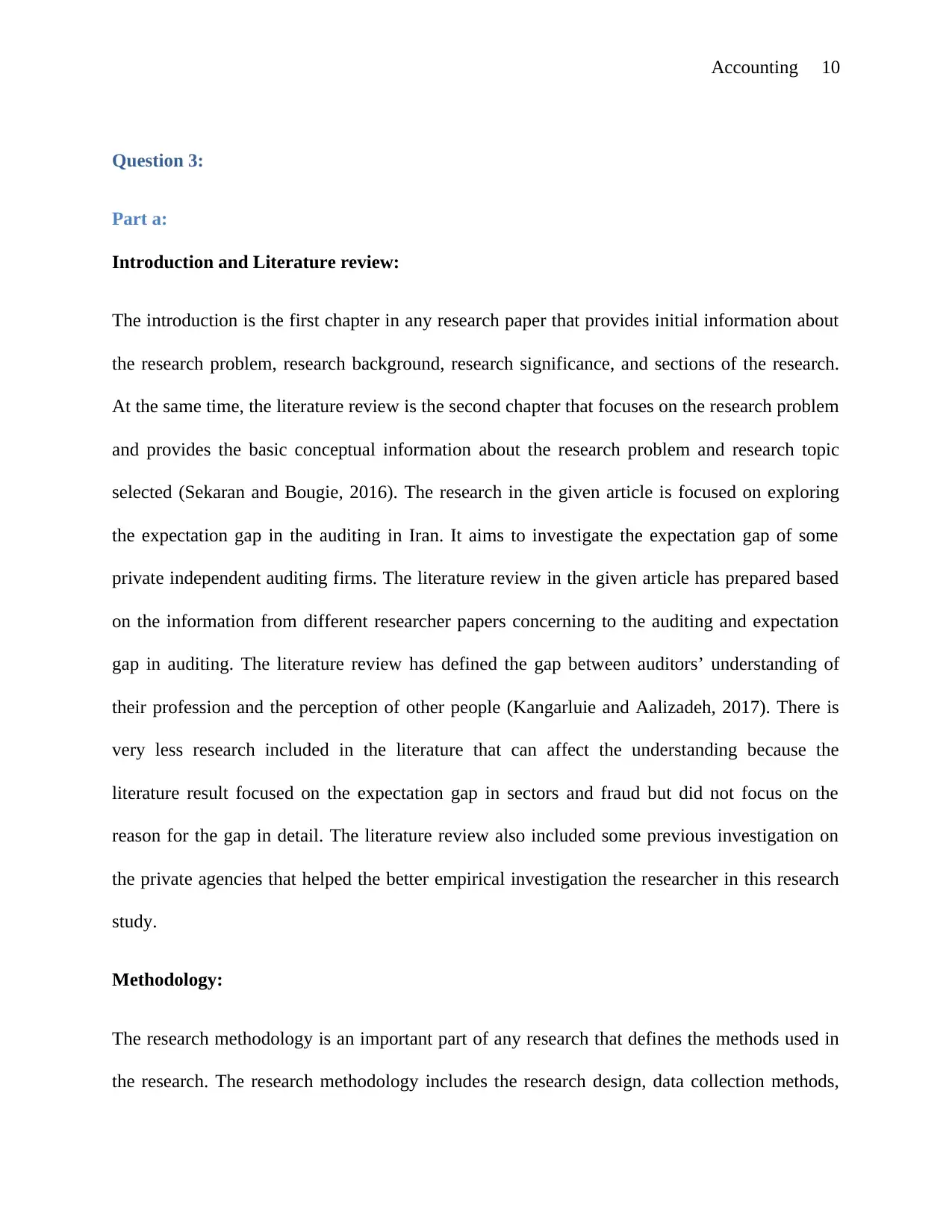
Accounting 10
Question 3:
Part a:
Introduction and Literature review:
The introduction is the first chapter in any research paper that provides initial information about
the research problem, research background, research significance, and sections of the research.
At the same time, the literature review is the second chapter that focuses on the research problem
and provides the basic conceptual information about the research problem and research topic
selected (Sekaran and Bougie, 2016). The research in the given article is focused on exploring
the expectation gap in the auditing in Iran. It aims to investigate the expectation gap of some
private independent auditing firms. The literature review in the given article has prepared based
on the information from different researcher papers concerning to the auditing and expectation
gap in auditing. The literature review has defined the gap between auditors’ understanding of
their profession and the perception of other people (Kangarluie and Aalizadeh, 2017). There is
very less research included in the literature that can affect the understanding because the
literature result focused on the expectation gap in sectors and fraud but did not focus on the
reason for the gap in detail. The literature review also included some previous investigation on
the private agencies that helped the better empirical investigation the researcher in this research
study.
Methodology:
The research methodology is an important part of any research that defines the methods used in
the research. The research methodology includes the research design, data collection methods,
Question 3:
Part a:
Introduction and Literature review:
The introduction is the first chapter in any research paper that provides initial information about
the research problem, research background, research significance, and sections of the research.
At the same time, the literature review is the second chapter that focuses on the research problem
and provides the basic conceptual information about the research problem and research topic
selected (Sekaran and Bougie, 2016). The research in the given article is focused on exploring
the expectation gap in the auditing in Iran. It aims to investigate the expectation gap of some
private independent auditing firms. The literature review in the given article has prepared based
on the information from different researcher papers concerning to the auditing and expectation
gap in auditing. The literature review has defined the gap between auditors’ understanding of
their profession and the perception of other people (Kangarluie and Aalizadeh, 2017). There is
very less research included in the literature that can affect the understanding because the
literature result focused on the expectation gap in sectors and fraud but did not focus on the
reason for the gap in detail. The literature review also included some previous investigation on
the private agencies that helped the better empirical investigation the researcher in this research
study.
Methodology:
The research methodology is an important part of any research that defines the methods used in
the research. The research methodology includes the research design, data collection methods,
Secure Best Marks with AI Grader
Need help grading? Try our AI Grader for instant feedback on your assignments.
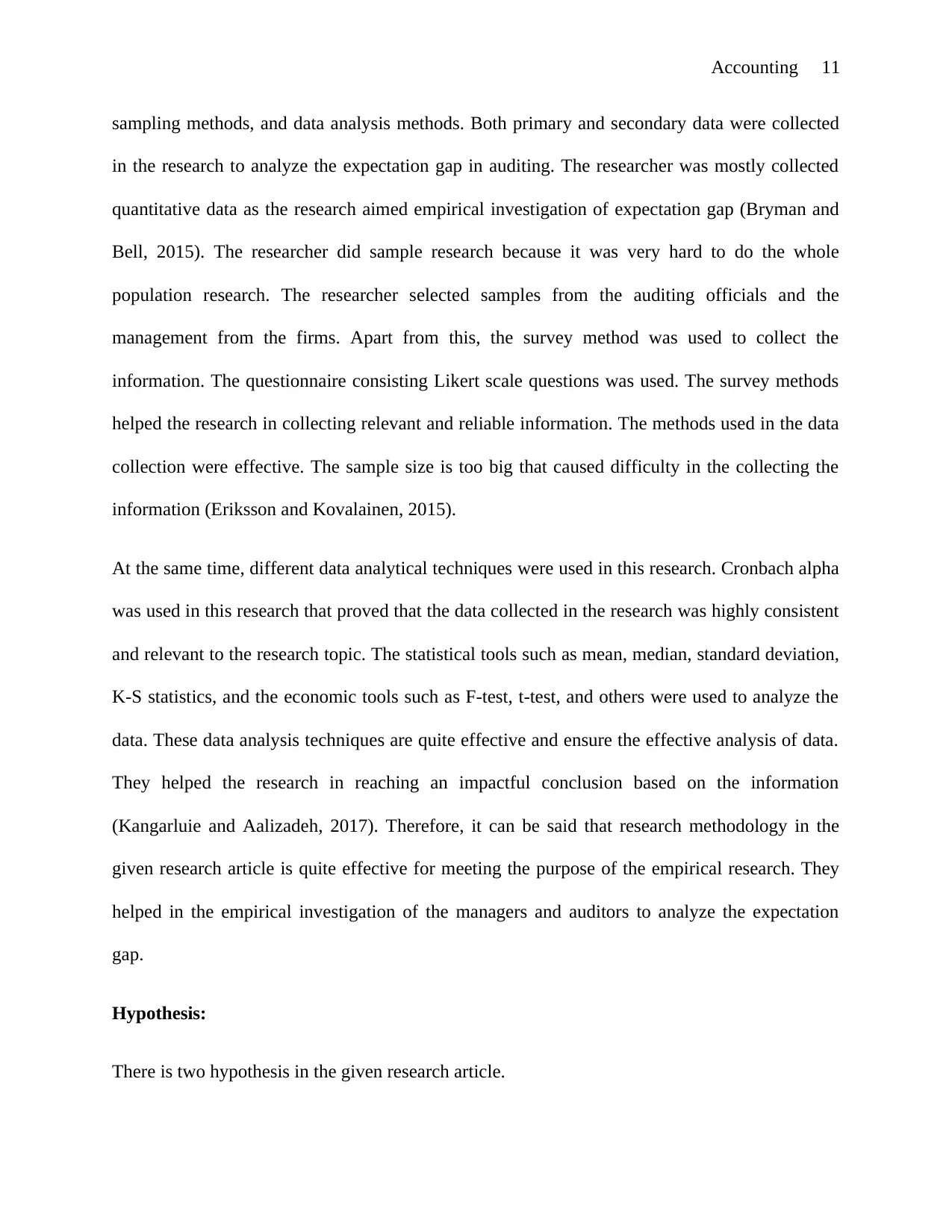
Accounting 11
sampling methods, and data analysis methods. Both primary and secondary data were collected
in the research to analyze the expectation gap in auditing. The researcher was mostly collected
quantitative data as the research aimed empirical investigation of expectation gap (Bryman and
Bell, 2015). The researcher did sample research because it was very hard to do the whole
population research. The researcher selected samples from the auditing officials and the
management from the firms. Apart from this, the survey method was used to collect the
information. The questionnaire consisting Likert scale questions was used. The survey methods
helped the research in collecting relevant and reliable information. The methods used in the data
collection were effective. The sample size is too big that caused difficulty in the collecting the
information (Eriksson and Kovalainen, 2015).
At the same time, different data analytical techniques were used in this research. Cronbach alpha
was used in this research that proved that the data collected in the research was highly consistent
and relevant to the research topic. The statistical tools such as mean, median, standard deviation,
K-S statistics, and the economic tools such as F-test, t-test, and others were used to analyze the
data. These data analysis techniques are quite effective and ensure the effective analysis of data.
They helped the research in reaching an impactful conclusion based on the information
(Kangarluie and Aalizadeh, 2017). Therefore, it can be said that research methodology in the
given research article is quite effective for meeting the purpose of the empirical research. They
helped in the empirical investigation of the managers and auditors to analyze the expectation
gap.
Hypothesis:
There is two hypothesis in the given research article.
sampling methods, and data analysis methods. Both primary and secondary data were collected
in the research to analyze the expectation gap in auditing. The researcher was mostly collected
quantitative data as the research aimed empirical investigation of expectation gap (Bryman and
Bell, 2015). The researcher did sample research because it was very hard to do the whole
population research. The researcher selected samples from the auditing officials and the
management from the firms. Apart from this, the survey method was used to collect the
information. The questionnaire consisting Likert scale questions was used. The survey methods
helped the research in collecting relevant and reliable information. The methods used in the data
collection were effective. The sample size is too big that caused difficulty in the collecting the
information (Eriksson and Kovalainen, 2015).
At the same time, different data analytical techniques were used in this research. Cronbach alpha
was used in this research that proved that the data collected in the research was highly consistent
and relevant to the research topic. The statistical tools such as mean, median, standard deviation,
K-S statistics, and the economic tools such as F-test, t-test, and others were used to analyze the
data. These data analysis techniques are quite effective and ensure the effective analysis of data.
They helped the research in reaching an impactful conclusion based on the information
(Kangarluie and Aalizadeh, 2017). Therefore, it can be said that research methodology in the
given research article is quite effective for meeting the purpose of the empirical research. They
helped in the empirical investigation of the managers and auditors to analyze the expectation
gap.
Hypothesis:
There is two hypothesis in the given research article.
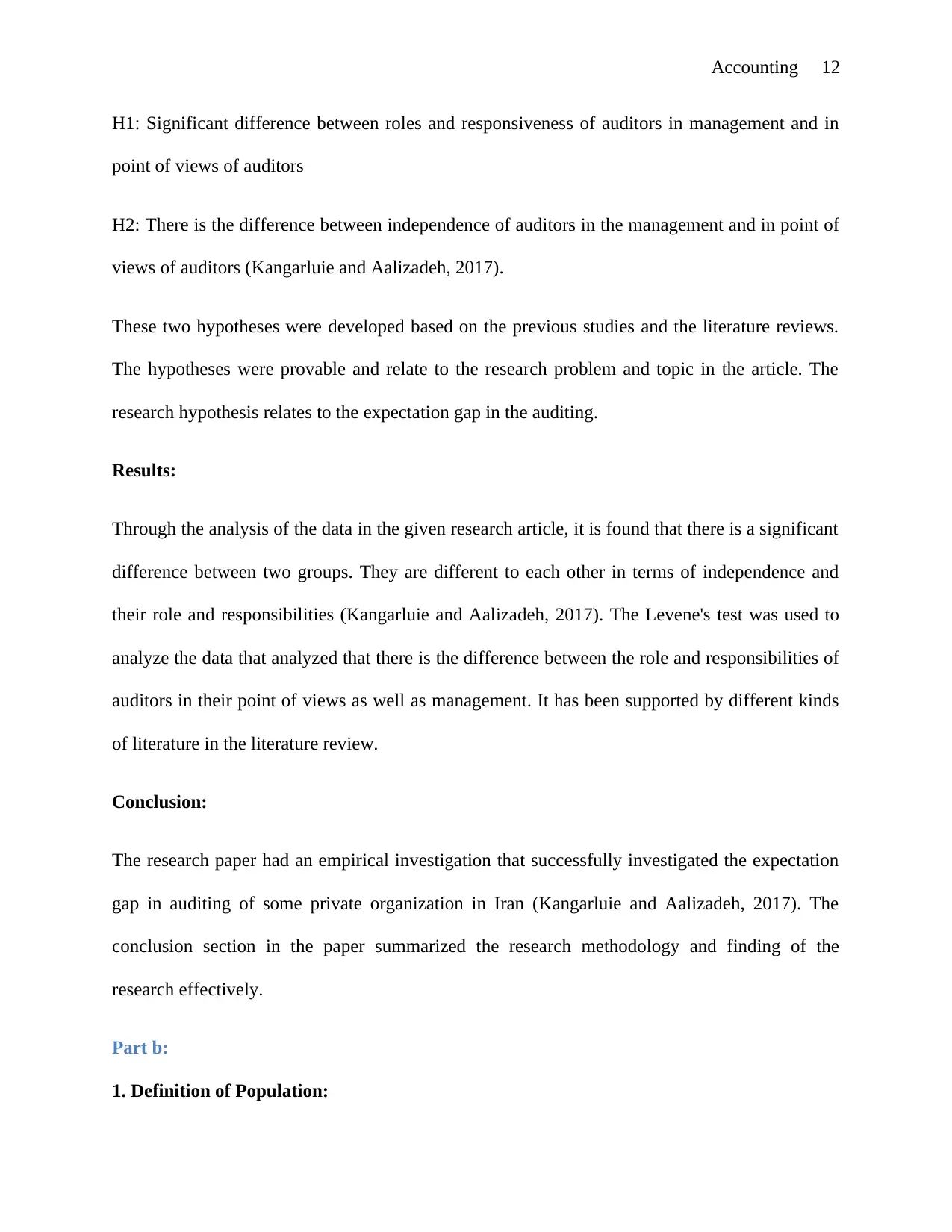
Accounting 12
H1: Significant difference between roles and responsiveness of auditors in management and in
point of views of auditors
H2: There is the difference between independence of auditors in the management and in point of
views of auditors (Kangarluie and Aalizadeh, 2017).
These two hypotheses were developed based on the previous studies and the literature reviews.
The hypotheses were provable and relate to the research problem and topic in the article. The
research hypothesis relates to the expectation gap in the auditing.
Results:
Through the analysis of the data in the given research article, it is found that there is a significant
difference between two groups. They are different to each other in terms of independence and
their role and responsibilities (Kangarluie and Aalizadeh, 2017). The Levene's test was used to
analyze the data that analyzed that there is the difference between the role and responsibilities of
auditors in their point of views as well as management. It has been supported by different kinds
of literature in the literature review.
Conclusion:
The research paper had an empirical investigation that successfully investigated the expectation
gap in auditing of some private organization in Iran (Kangarluie and Aalizadeh, 2017). The
conclusion section in the paper summarized the research methodology and finding of the
research effectively.
Part b:
1. Definition of Population:
H1: Significant difference between roles and responsiveness of auditors in management and in
point of views of auditors
H2: There is the difference between independence of auditors in the management and in point of
views of auditors (Kangarluie and Aalizadeh, 2017).
These two hypotheses were developed based on the previous studies and the literature reviews.
The hypotheses were provable and relate to the research problem and topic in the article. The
research hypothesis relates to the expectation gap in the auditing.
Results:
Through the analysis of the data in the given research article, it is found that there is a significant
difference between two groups. They are different to each other in terms of independence and
their role and responsibilities (Kangarluie and Aalizadeh, 2017). The Levene's test was used to
analyze the data that analyzed that there is the difference between the role and responsibilities of
auditors in their point of views as well as management. It has been supported by different kinds
of literature in the literature review.
Conclusion:
The research paper had an empirical investigation that successfully investigated the expectation
gap in auditing of some private organization in Iran (Kangarluie and Aalizadeh, 2017). The
conclusion section in the paper summarized the research methodology and finding of the
research effectively.
Part b:
1. Definition of Population:
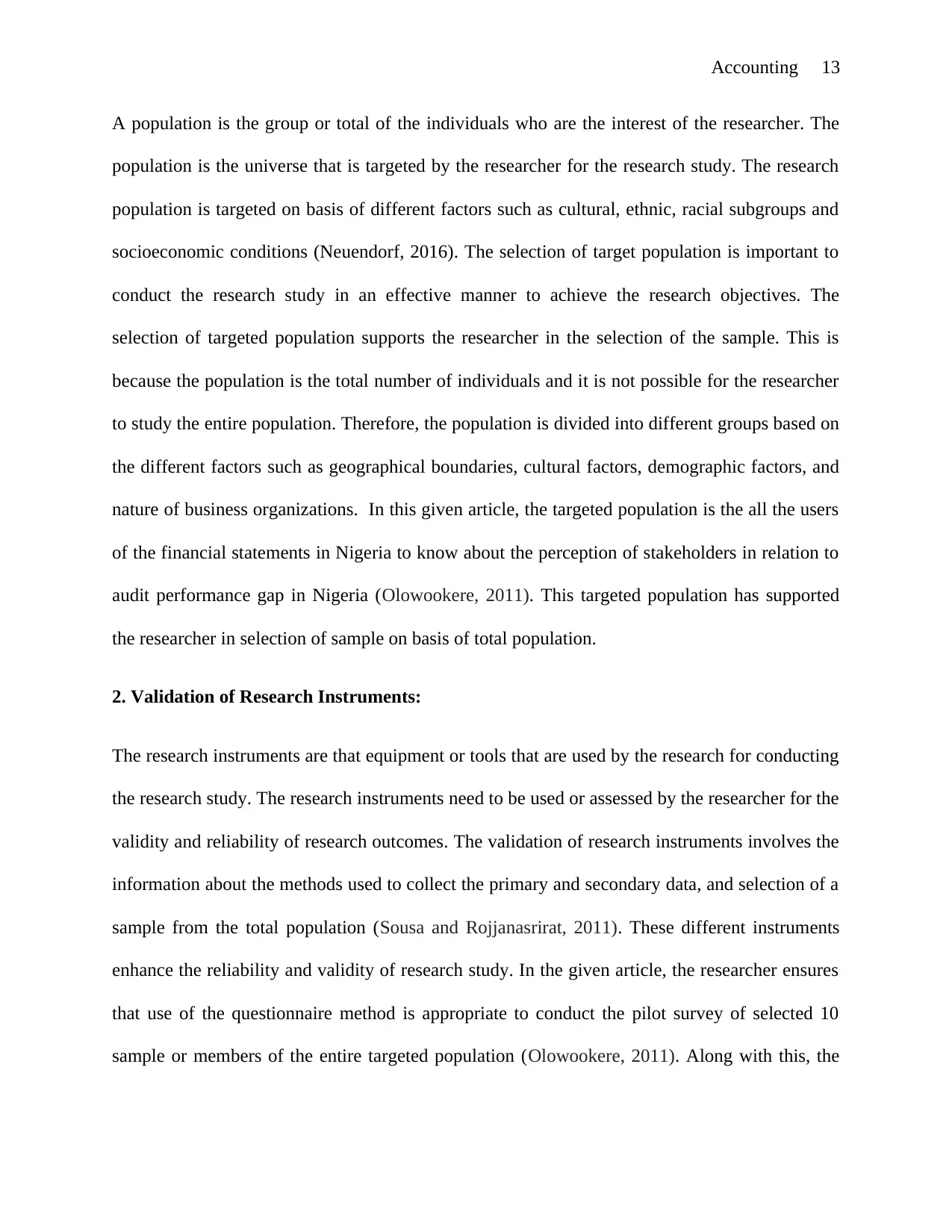
Accounting 13
A population is the group or total of the individuals who are the interest of the researcher. The
population is the universe that is targeted by the researcher for the research study. The research
population is targeted on basis of different factors such as cultural, ethnic, racial subgroups and
socioeconomic conditions (Neuendorf, 2016). The selection of target population is important to
conduct the research study in an effective manner to achieve the research objectives. The
selection of targeted population supports the researcher in the selection of the sample. This is
because the population is the total number of individuals and it is not possible for the researcher
to study the entire population. Therefore, the population is divided into different groups based on
the different factors such as geographical boundaries, cultural factors, demographic factors, and
nature of business organizations. In this given article, the targeted population is the all the users
of the financial statements in Nigeria to know about the perception of stakeholders in relation to
audit performance gap in Nigeria (Olowookere, 2011). This targeted population has supported
the researcher in selection of sample on basis of total population.
2. Validation of Research Instruments:
The research instruments are that equipment or tools that are used by the research for conducting
the research study. The research instruments need to be used or assessed by the researcher for the
validity and reliability of research outcomes. The validation of research instruments involves the
information about the methods used to collect the primary and secondary data, and selection of a
sample from the total population (Sousa and Rojjanasrirat, 2011). These different instruments
enhance the reliability and validity of research study. In the given article, the researcher ensures
that use of the questionnaire method is appropriate to conduct the pilot survey of selected 10
sample or members of the entire targeted population (Olowookere, 2011). Along with this, the
A population is the group or total of the individuals who are the interest of the researcher. The
population is the universe that is targeted by the researcher for the research study. The research
population is targeted on basis of different factors such as cultural, ethnic, racial subgroups and
socioeconomic conditions (Neuendorf, 2016). The selection of target population is important to
conduct the research study in an effective manner to achieve the research objectives. The
selection of targeted population supports the researcher in the selection of the sample. This is
because the population is the total number of individuals and it is not possible for the researcher
to study the entire population. Therefore, the population is divided into different groups based on
the different factors such as geographical boundaries, cultural factors, demographic factors, and
nature of business organizations. In this given article, the targeted population is the all the users
of the financial statements in Nigeria to know about the perception of stakeholders in relation to
audit performance gap in Nigeria (Olowookere, 2011). This targeted population has supported
the researcher in selection of sample on basis of total population.
2. Validation of Research Instruments:
The research instruments are that equipment or tools that are used by the research for conducting
the research study. The research instruments need to be used or assessed by the researcher for the
validity and reliability of research outcomes. The validation of research instruments involves the
information about the methods used to collect the primary and secondary data, and selection of a
sample from the total population (Sousa and Rojjanasrirat, 2011). These different instruments
enhance the reliability and validity of research study. In the given article, the researcher ensures
that use of the questionnaire method is appropriate to conduct the pilot survey of selected 10
sample or members of the entire targeted population (Olowookere, 2011). Along with this, the
Paraphrase This Document
Need a fresh take? Get an instant paraphrase of this document with our AI Paraphraser
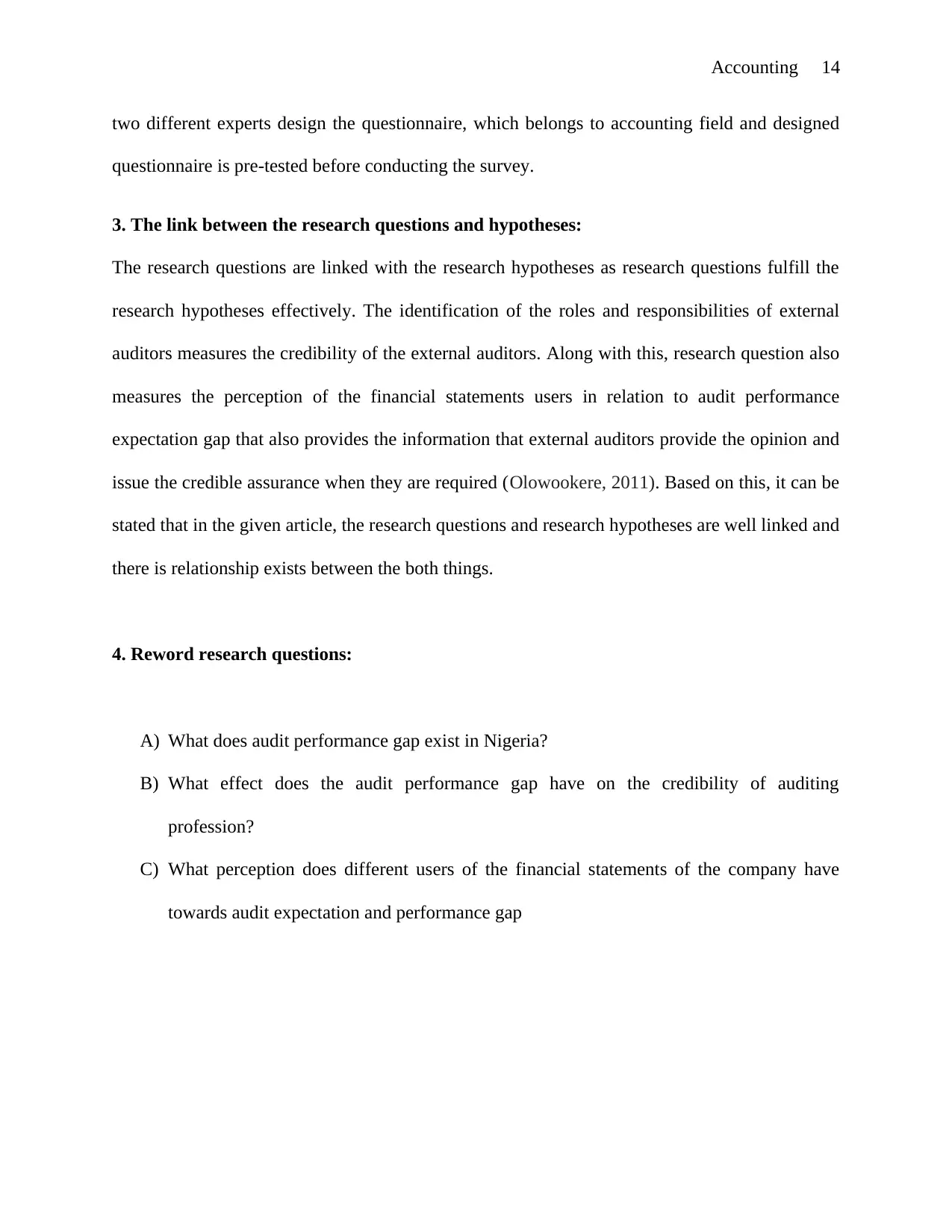
Accounting 14
two different experts design the questionnaire, which belongs to accounting field and designed
questionnaire is pre-tested before conducting the survey.
3. The link between the research questions and hypotheses:
The research questions are linked with the research hypotheses as research questions fulfill the
research hypotheses effectively. The identification of the roles and responsibilities of external
auditors measures the credibility of the external auditors. Along with this, research question also
measures the perception of the financial statements users in relation to audit performance
expectation gap that also provides the information that external auditors provide the opinion and
issue the credible assurance when they are required (Olowookere, 2011). Based on this, it can be
stated that in the given article, the research questions and research hypotheses are well linked and
there is relationship exists between the both things.
4. Reword research questions:
A) What does audit performance gap exist in Nigeria?
B) What effect does the audit performance gap have on the credibility of auditing
profession?
C) What perception does different users of the financial statements of the company have
towards audit expectation and performance gap
two different experts design the questionnaire, which belongs to accounting field and designed
questionnaire is pre-tested before conducting the survey.
3. The link between the research questions and hypotheses:
The research questions are linked with the research hypotheses as research questions fulfill the
research hypotheses effectively. The identification of the roles and responsibilities of external
auditors measures the credibility of the external auditors. Along with this, research question also
measures the perception of the financial statements users in relation to audit performance
expectation gap that also provides the information that external auditors provide the opinion and
issue the credible assurance when they are required (Olowookere, 2011). Based on this, it can be
stated that in the given article, the research questions and research hypotheses are well linked and
there is relationship exists between the both things.
4. Reword research questions:
A) What does audit performance gap exist in Nigeria?
B) What effect does the audit performance gap have on the credibility of auditing
profession?
C) What perception does different users of the financial statements of the company have
towards audit expectation and performance gap
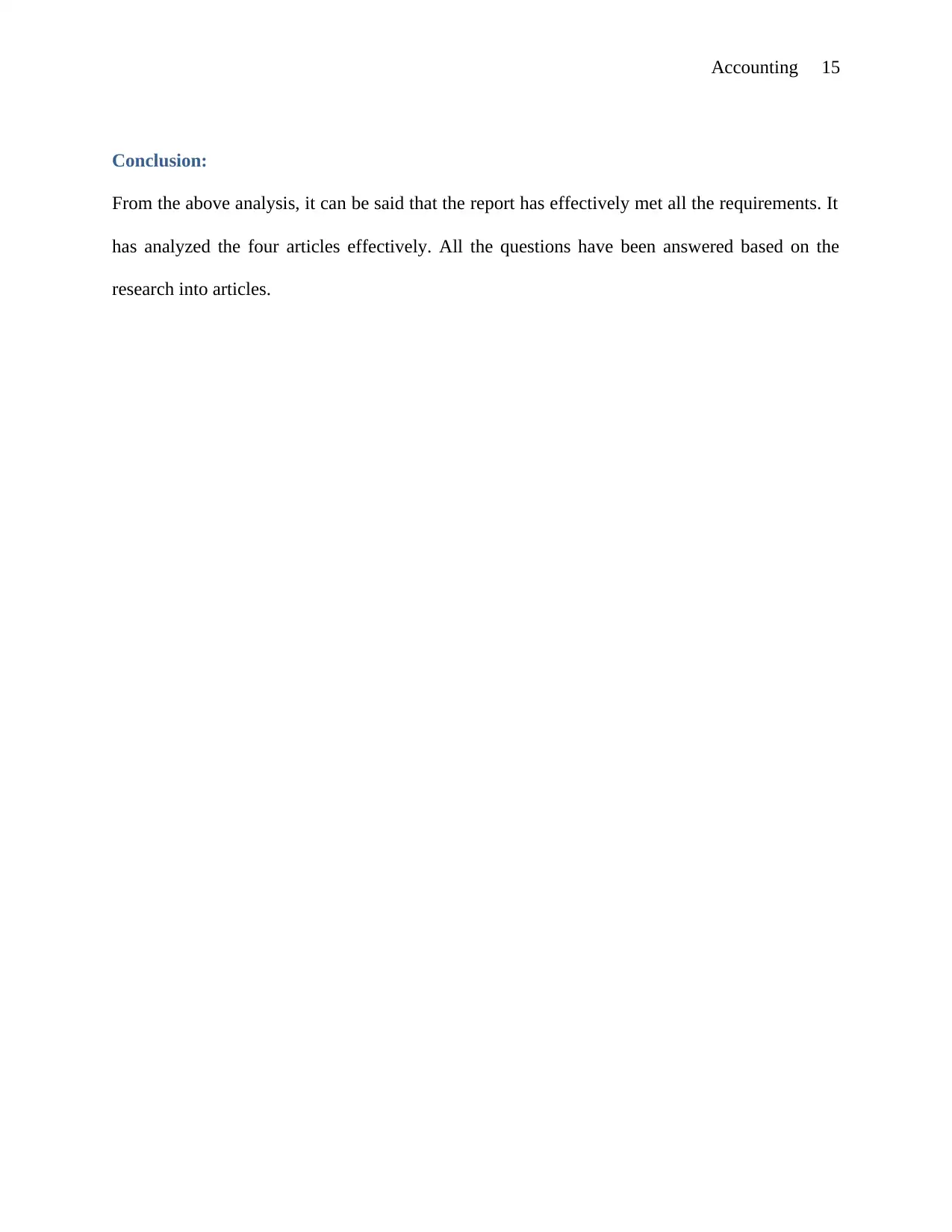
Accounting 15
Conclusion:
From the above analysis, it can be said that the report has effectively met all the requirements. It
has analyzed the four articles effectively. All the questions have been answered based on the
research into articles.
Conclusion:
From the above analysis, it can be said that the report has effectively met all the requirements. It
has analyzed the four articles effectively. All the questions have been answered based on the
research into articles.
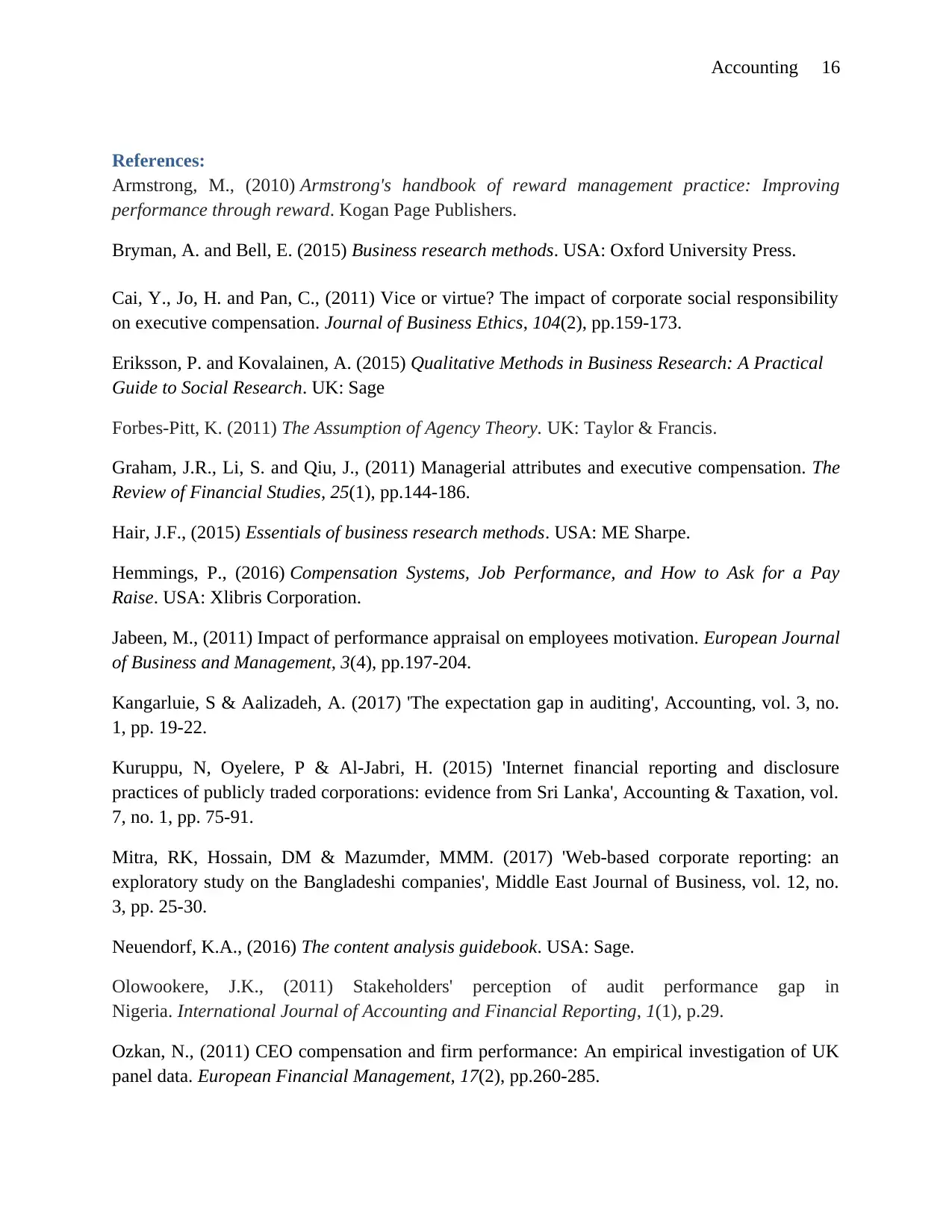
Accounting 16
References:
Armstrong, M., (2010) Armstrong's handbook of reward management practice: Improving
performance through reward. Kogan Page Publishers.
Bryman, A. and Bell, E. (2015) Business research methods. USA: Oxford University Press.
Cai, Y., Jo, H. and Pan, C., (2011) Vice or virtue? The impact of corporate social responsibility
on executive compensation. Journal of Business Ethics, 104(2), pp.159-173.
Eriksson, P. and Kovalainen, A. (2015) Qualitative Methods in Business Research: A Practical
Guide to Social Research. UK: Sage
Forbes-Pitt, K. (2011) The Assumption of Agency Theory. UK: Taylor & Francis.
Graham, J.R., Li, S. and Qiu, J., (2011) Managerial attributes and executive compensation. The
Review of Financial Studies, 25(1), pp.144-186.
Hair, J.F., (2015) Essentials of business research methods. USA: ME Sharpe.
Hemmings, P., (2016) Compensation Systems, Job Performance, and How to Ask for a Pay
Raise. USA: Xlibris Corporation.
Jabeen, M., (2011) Impact of performance appraisal on employees motivation. European Journal
of Business and Management, 3(4), pp.197-204.
Kangarluie, S & Aalizadeh, A. (2017) 'The expectation gap in auditing', Accounting, vol. 3, no.
1, pp. 19-22.
Kuruppu, N, Oyelere, P & Al-Jabri, H. (2015) 'Internet financial reporting and disclosure
practices of publicly traded corporations: evidence from Sri Lanka', Accounting & Taxation, vol.
7, no. 1, pp. 75-91.
Mitra, RK, Hossain, DM & Mazumder, MMM. (2017) 'Web-based corporate reporting: an
exploratory study on the Bangladeshi companies', Middle East Journal of Business, vol. 12, no.
3, pp. 25-30.
Neuendorf, K.A., (2016) The content analysis guidebook. USA: Sage.
Olowookere, J.K., (2011) Stakeholders' perception of audit performance gap in
Nigeria. International Journal of Accounting and Financial Reporting, 1(1), p.29.
Ozkan, N., (2011) CEO compensation and firm performance: An empirical investigation of UK
panel data. European Financial Management, 17(2), pp.260-285.
References:
Armstrong, M., (2010) Armstrong's handbook of reward management practice: Improving
performance through reward. Kogan Page Publishers.
Bryman, A. and Bell, E. (2015) Business research methods. USA: Oxford University Press.
Cai, Y., Jo, H. and Pan, C., (2011) Vice or virtue? The impact of corporate social responsibility
on executive compensation. Journal of Business Ethics, 104(2), pp.159-173.
Eriksson, P. and Kovalainen, A. (2015) Qualitative Methods in Business Research: A Practical
Guide to Social Research. UK: Sage
Forbes-Pitt, K. (2011) The Assumption of Agency Theory. UK: Taylor & Francis.
Graham, J.R., Li, S. and Qiu, J., (2011) Managerial attributes and executive compensation. The
Review of Financial Studies, 25(1), pp.144-186.
Hair, J.F., (2015) Essentials of business research methods. USA: ME Sharpe.
Hemmings, P., (2016) Compensation Systems, Job Performance, and How to Ask for a Pay
Raise. USA: Xlibris Corporation.
Jabeen, M., (2011) Impact of performance appraisal on employees motivation. European Journal
of Business and Management, 3(4), pp.197-204.
Kangarluie, S & Aalizadeh, A. (2017) 'The expectation gap in auditing', Accounting, vol. 3, no.
1, pp. 19-22.
Kuruppu, N, Oyelere, P & Al-Jabri, H. (2015) 'Internet financial reporting and disclosure
practices of publicly traded corporations: evidence from Sri Lanka', Accounting & Taxation, vol.
7, no. 1, pp. 75-91.
Mitra, RK, Hossain, DM & Mazumder, MMM. (2017) 'Web-based corporate reporting: an
exploratory study on the Bangladeshi companies', Middle East Journal of Business, vol. 12, no.
3, pp. 25-30.
Neuendorf, K.A., (2016) The content analysis guidebook. USA: Sage.
Olowookere, J.K., (2011) Stakeholders' perception of audit performance gap in
Nigeria. International Journal of Accounting and Financial Reporting, 1(1), p.29.
Ozkan, N., (2011) CEO compensation and firm performance: An empirical investigation of UK
panel data. European Financial Management, 17(2), pp.260-285.
Secure Best Marks with AI Grader
Need help grading? Try our AI Grader for instant feedback on your assignments.
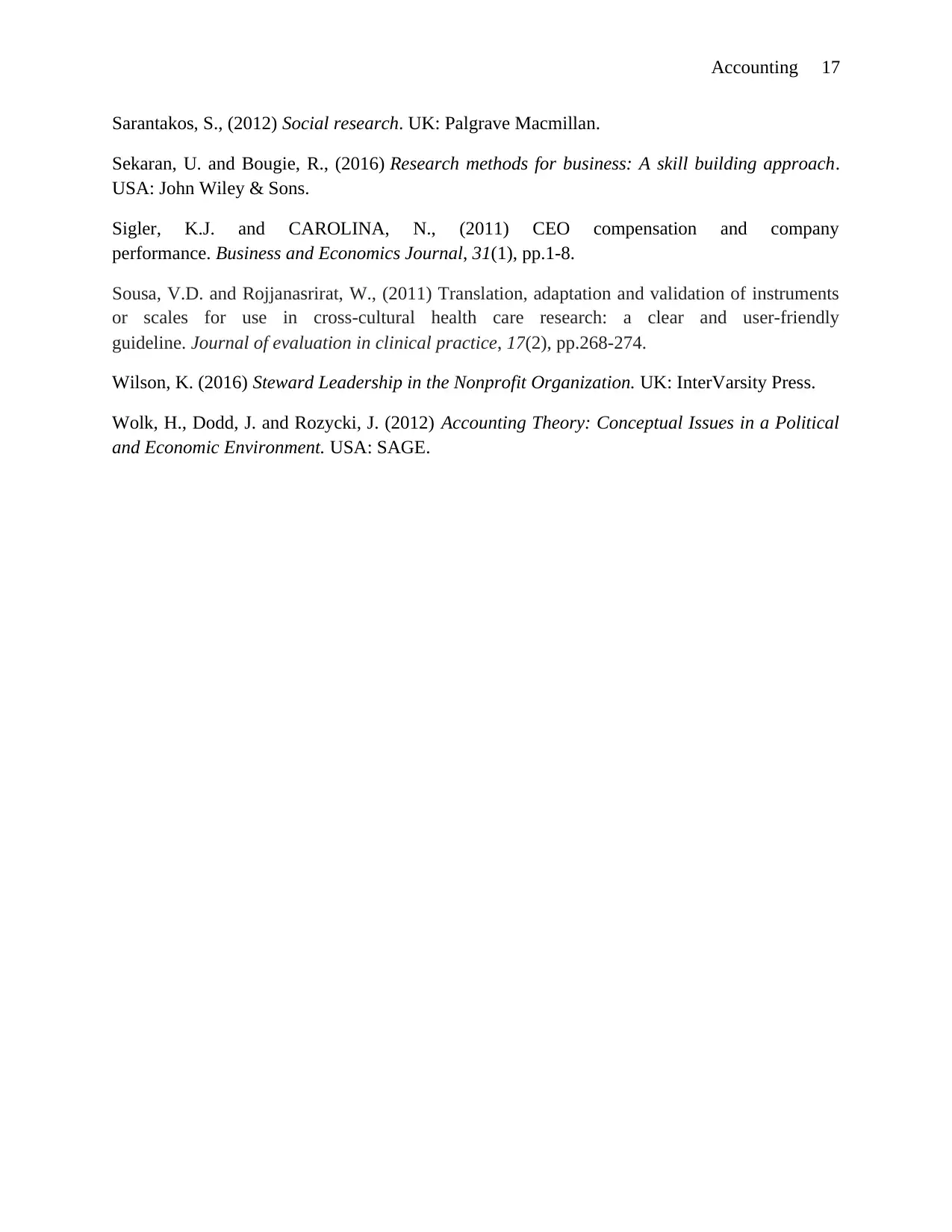
Accounting 17
Sarantakos, S., (2012) Social research. UK: Palgrave Macmillan.
Sekaran, U. and Bougie, R., (2016) Research methods for business: A skill building approach.
USA: John Wiley & Sons.
Sigler, K.J. and CAROLINA, N., (2011) CEO compensation and company
performance. Business and Economics Journal, 31(1), pp.1-8.
Sousa, V.D. and Rojjanasrirat, W., (2011) Translation, adaptation and validation of instruments
or scales for use in cross‐cultural health care research: a clear and user‐friendly
guideline. Journal of evaluation in clinical practice, 17(2), pp.268-274.
Wilson, K. (2016) Steward Leadership in the Nonprofit Organization. UK: InterVarsity Press.
Wolk, H., Dodd, J. and Rozycki, J. (2012) Accounting Theory: Conceptual Issues in a Political
and Economic Environment. USA: SAGE.
Sarantakos, S., (2012) Social research. UK: Palgrave Macmillan.
Sekaran, U. and Bougie, R., (2016) Research methods for business: A skill building approach.
USA: John Wiley & Sons.
Sigler, K.J. and CAROLINA, N., (2011) CEO compensation and company
performance. Business and Economics Journal, 31(1), pp.1-8.
Sousa, V.D. and Rojjanasrirat, W., (2011) Translation, adaptation and validation of instruments
or scales for use in cross‐cultural health care research: a clear and user‐friendly
guideline. Journal of evaluation in clinical practice, 17(2), pp.268-274.
Wilson, K. (2016) Steward Leadership in the Nonprofit Organization. UK: InterVarsity Press.
Wolk, H., Dodd, J. and Rozycki, J. (2012) Accounting Theory: Conceptual Issues in a Political
and Economic Environment. USA: SAGE.
1 out of 17
Related Documents
Your All-in-One AI-Powered Toolkit for Academic Success.
+13062052269
info@desklib.com
Available 24*7 on WhatsApp / Email
![[object Object]](/_next/static/media/star-bottom.7253800d.svg)
Unlock your academic potential
© 2024 | Zucol Services PVT LTD | All rights reserved.





